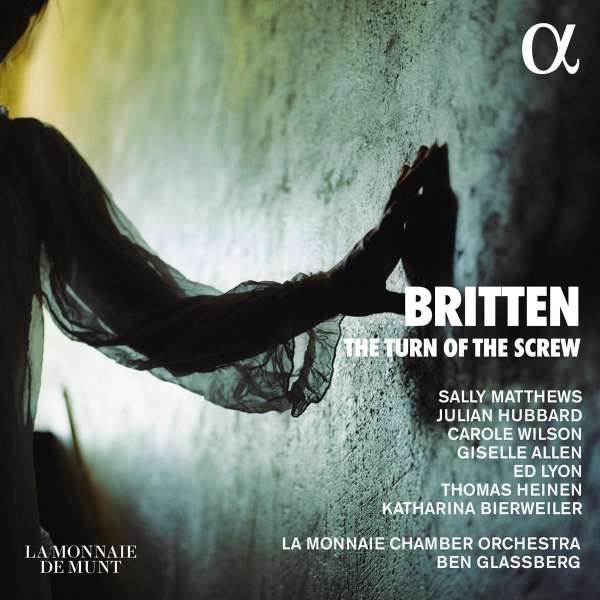The Turn of the Screw ist eine Oper von Benjamin Britten auf ein Libretto von Myfanwy Piper, das auf einem Kurzroman von Henry James beruht. Im Prolog fasst ein Erzähler den Inhalt einer « fantastischen » Geschichte zusammen. Eine junge Gouvernante wird vom Vormund nach Bly Manor geschickt, um dort zusammen mit dem Hausmädchen und der Verwalterin Mrs. Grose für Wohlergehen und Erziehung der beiden verwaisten Kinder Flora und Miles zu sorgen. Doch schon bald merkt die Neue (oder redet sie sich das ein?), dass die Kinder unter dem Einfluss von Geistern stehen, und zwar der früheren Haushälterin Miss Jessel und von deren Geliebten Peter Quint, die beide kurz zuvor unter ungeklärten Umständen verstorben sind. Sie verfolgen die gesamte Handlung der Oper, bis hin zu Floras mysteriösem Verschwinden und dem Tod des jungen Miles. In dieser Oper stellt Britten sowohl banale alltägliche Dinge wie auch die beunruhigende Fremdartigkeit eines chimärischen Universums dar.
Die Produktion aus Brüssel hat nach ihrer Corona-bedingten Präsentation im Internet nun auch den Weg auf CD gefunden, so dass man sich hier ganz auf die akustischen Eindrücke konzentrieren kann. Und diese sind sehr überzeugend.
Sally Matthews prägt die Rolle der Gouvernante mit einer farbenprächtigen und engagierten Gesangsleistung, in der sie durch die Bandbreite der Nuancen und die Palette der Emotionen besticht. Carole Wilson als Haushälterin Mrs. Grose fügt eine gleichgewichtige Rollendarstellung hinzu, in der sie abwechselnd hingebungsvoll, distanziert und entsetzt agiert. Katharina Bierweiler, Mitglied des Cantus Juvenum Karlsruhe, bringt die Ambiguität der Rolle der Sally wunderbar zum Ausdruck, während der junge Henry de Beaufort vom Kinderchor der Monnaie mit engelhafter Zerbrechlichkeit und mitunter leicht schwebenden Intonation einen Miles darstellt, der der Erwachsenenwelt geopfert wird, die ihn überfordert. Giselle Allen gibt der Miss Jessel trotz der Kürze ihrer Auftritte eine tadellose Note mit attraktivem und verführerischem Gesang.
Besonders zu loben ist das Engagement der Solisten des Orchesters der Monnaie, die präzise von Ben Glassberg geleitet werden. Die Instrumente werden rein oder nostalgisch, manchmal auch robust und überschwänglich eingesetzt und tragen so provokant dazu bei, dieses Bild der zerbrochenen Unschuld und der damit einhergehenden Verzerrung zu zeigen.
Im Vergleich zu der Einspielung von 1955 mit Britten, Pears und der English Opera wirkt diese Aufnahme eher frisch als geschliffen und damit punktuell auch kantiger und damit spontaner.
The Turn of the Screw is an opera by Benjamin Britten to a libretto by Myfanwy Piper, based on a short novel by Henry James. In the prologue, a narrator summarizes the content of a « fantastic » story. A young governess is sent to Bly Manor by her guardian to care for the welfare and education of the two orphaned children, Flora and Miles, along with the maid and caretaker Mrs. Grose. However, the new girl soon realizes (or does she tell herself?) that the children are under the influence of ghosts, namely the former housekeeper Miss Jessel and her lover Peter Quint, both of whom died shortly before under unexplained circumstances. They haunt the entire plot of the opera, up to Flora’s mysterious disappearance and the death of young Miles. In this opera, Britten depicts both banal everyday things and the unsettling strangeness of a chimerical universe.
This production from Brussels has now found its way onto CD after its Corona-conditioned presentation on the Internet, so that one can concentrate here entirely on the acoustic impressions. And these are very convincing.
Sally Matthews makes her mark on the role of the governess with a colorful and committed vocal performance in which she captivates with the range of nuances and palette of emotions. Carole Wilson as the housekeeper Mrs. Grose adds an equally balanced performance in which she is by turns devoted, detached, and horrified. Katharina Bierweiler, a member of the Cantus Juvenum Karlsruhe, beautifully expresses the ambiguity of the role of Sally, while young Henry de Beaufort of the Monnaie Children’s Choir portrays with angelic fragility and sometimes slightly floating intonation a Miles sacrificed to the adult world that overwhelms him. Giselle Allen, despite the brevity of her performance, gives Miss Jessel an impeccable note with attractive and seductive singing.
The commitment of the soloists of the Orchestre de la Monnaie, precisely directed by Ben Glassberg, deserves special praise. The instruments are used purely or nostalgically, sometimes robustly and exuberantly, contributing provocatively to this picture of broken innocence and the distortion that accompanies it.
Compared to the 1955 recording with Britten, Pears and English Opera, this recording seems fresh rather than polished, and thus edgier at points and thus more spontaneous.





















